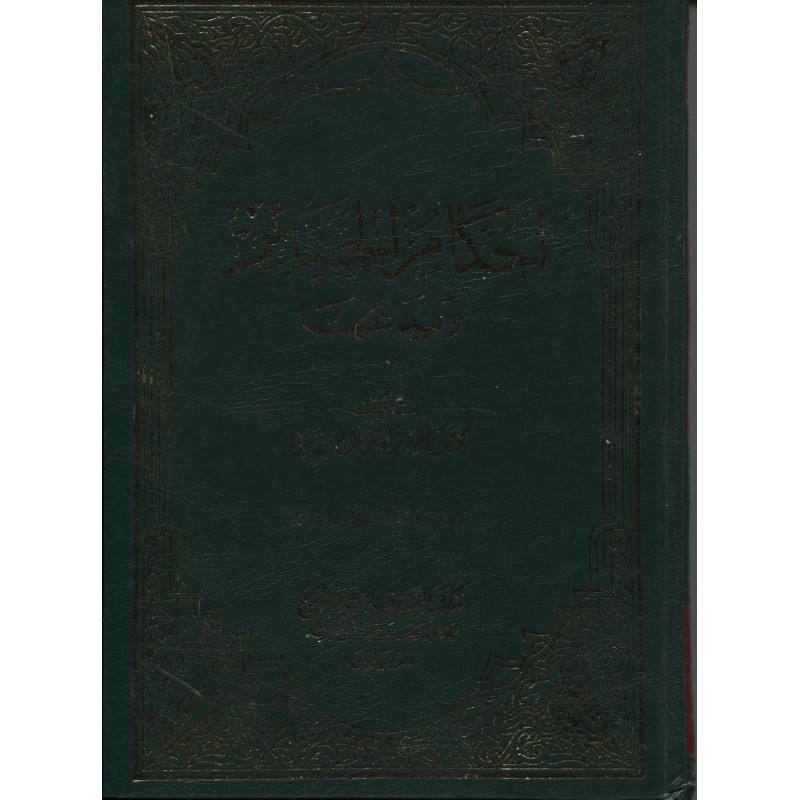

Promotions SANA: Jusqu’à -20%, Cliquez ici
Promotions SANA: Jusqu’à -20%, Cliquez ici
"Ahkam Al Jana'iz wa Bidaouha" (Funeral Rites and Their Innovations) is an important book written by Mohammed Nasser al-Albani. In this work, the author meticulously explores the essential funeral rituals for Muslims, drawing evidence from the Quran and the Sunnah (Prophetic traditions). The book delves into the Islamic teachings related to funerals, highlighting practices that align with the religion while avoiding unvalidated innovations. It covers various topics, including the responsibilities of the sick person in the face of their fate, recommendations to convey to the dying, the obligations of the deceased's close relatives after their passing, permissions and prohibitions for participants in funerals, as well as aspects of funeral washing, burial, and visiting graves. Finally, the book concludes with a special chapter dedicated to innovations in funerals,
أحكام الجنائز و بدعها، محمد ناصر الدين الألباني، طبعة جديدة منقحة ومزيدة ، مكتبة المعارف
رسالة مختصرة في آداب الجنائز في الاسلام، إستقصى الألباني في كتابه "أحكام الجنائز و بدعها" كل ما له علاقة بموضوعه من المسائل التي لها دليل من الكتاب والسنة، وأورد في أوله بعض الفصول والمسائل التي لا تذكر عادة في "باب الجنازة " مثل الوصية، وعلامات حسن الخاتمة، ونحو ذلك. و استوحى ترتيبه من الواقع، فافتتحه بفصل : (1 -ما يجب على المريض ) من الرضى بالقضاء والصبر على القدر وترك تمني الموت وأداء الحقوق . والوصية والاشهاد عليها . . . ثم : (2 -تلقين المحتضر ) وما على من حضره من التلقين وأمره بالشهادة . ثم (3-ما على الحاضرين بعد موته ) من غمض عينيه .والدعاء له وتغطيته .والتعجيل بتجهيزه . والمبادرة لقضاء دينه . ثم (4 -ما يجوز للحاضرين وغيرهم ) من كشف وجهه وتقبيله والبكاء عليه . ثم (5 -ما يجب على أقارب الميت ) من الصبر والرضا بالقدر ، والا سترجاع ، وإحداد المرأة على زوجها . ثم (6 -ما يحرم عليهم )من النياحة وضرب الخدود وشق الجيوب ،وغير ذلك كنعيه على المنائر ثم (7 - النعي الجائز ) . ثم ( 8 - علامات حسن الخاتمة ) . ثم ( 9 - ثناء الناس على الميت ).ثم ( 10 - غسل الميت ). وهكذا إلى الدفن وزيارة القبور. وختم الكتاب بفصل خاص ببدع الجنائز أستوعب فيه جميع ما وقف عليه من البدع منصوصا عليه في كتاب من كتب أهل العلم قديما وحديثا . عازيا كل بدعة إلى موضعها من كتبهم . وما لم يعز إليهم . فهو مما يحكم المنهج العلمي في أصول البدع أنه منها . ولكنه لم يرى من نص منهم عليها . وكثير منها من بدع العصر الحاضر .
"The Rulings of Funerals and Their Innovations," by Mohammed Nasser al-Albani, Revised and Expanded Edition, Al-Ma'arif Library Publications, Arabic Version.
This book delves into the details of the essential funeral rites for Muslims, examining them with great precision. The author explores various questions related to this topic, supported by evidence from the Quran and the Sunnah (Prophetic traditions). The book also covers chapters and questions that are not usually mentioned in the section on funerals, such as wills, signs of a good end of life, and similar subjects. The order of the chapters is inspired by reality, starting with the first chapter: (1 - What is obligatory for the sick person), including accepting destiny, having patience with divine decree, relinquishing the desire for death, and fulfilling one's rights. Then, (2 - Reminding the dying person of faith-related words) and what the people present should remind them of and ask them to testify. Next, (3 - Obligations of those present after the person's death), such as closing their eyes, making supplications for them, covering them, promptly preparing for their funeral, and taking the initiative to settle their debts. Then, (4 - Permissible actions for those present and others), such as uncovering their face, kissing them, and weeping over them. Following that, (5 - Obligations of the deceased's close relatives), which include patience, accepting destiny, refraining from complaining, and preparing the wife for life without her husband. Then, (6 - Prohibited actions for them), such as lamentations, striking the cheeks, tearing clothes, and other similar practices, including reciting funeral poems. Subsequently, (7 - Permissible forms of lamentation). Then, (8 - Signs of a good end of life). Then, (9 - Praises from people about the deceased). Then, (10 - The funeral washing), and so on, until the burial and visiting of graves. The book concludes with a special chapter on innovations in funerals, where the author lists all the innovations he found, referring to the writings of ancient and contemporary scholars.
Data sheet
Specific References
No customer reviews for the moment.